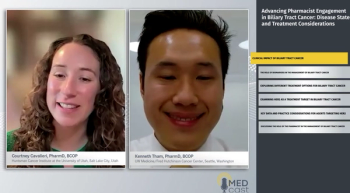
Keri Bates, PharmD, shares how the nomination validates years of hard work, highlights the deep relationships built with the community, and inspires continued growth and innovation.

Keri Bates, PharmD, shares how the nomination validates years of hard work, highlights the deep relationships built with the community, and inspires continued growth and innovation.

Empowering pharmacy technicians enhances team efficiency, improves patient care, and fosters a positive work culture, driving pharmacy success in a competitive landscape.

These health care professionals are crucial to optimizing safety in medication therapy, addressing policy barriers, and the collaboration with others in the field.


Panelists discuss how pharmacists play a crucial role in biliary tract cancer management by leveraging their detailed medication knowledge to assist with treatment selection, develop comprehensive monitoring plans (especially for hyperphosphatemia with FGFR inhibitors and cardiac monitoring with HER2 therapies), educate patients about unique toxicities and self-management strategies, create clinic workflow algorithms for toxicity management, and advocate for maximizing time on therapy as long as patients maintain response or stable disease given the limited treatment options available for this rare cancer type.

Panelists discuss how trastuzumab deruxtecan demonstrated a 22% overall response rate in patients with biliary tract cancer (56.3% in HER2 3+ patients) with 7.4 months progression-free survival in the tumor-agnostic DESTINY-PanTumor02 trial, while zanidatamab showed a 52% confirmed response rate with 7.2 months progression-free survival in HER2 3+ patients in the biliary-specific HERIZON-BTC-01 trial, with treatment selection between these agents requiring individualized case-by-case decisions based on toxicity profiles, dosing schedules, and patient-specific factors since no head-to-head comparison data exist.

Panelists discuss how HER2-targeted agents in biliary tract cancers include trastuzumab deruxtecan (an antibody-drug conjugate that acts like a “smart missile” delivering cytotoxic payload to HER2-expressing cells with risks of pneumonitis and myelosuppression) and zanidatamab (a bispecific antibody targeting 2 different HER2 epitopes simultaneously for enhanced cytotoxicity with primarily antibody-related toxicities like cardiac effects and diarrhea but without chemotherapy-related adverse effects).

Panelists discuss how first-line treatment typically involves gemcitabine-based cytotoxic chemotherapy (particularly gemcitabine with cisplatin) that has evolved to include chemo-immunotherapy combinations with checkpoint inhibitors like durvalumab and pembrolizumab, while second-line options include FOLFOX and targeted therapies based on specific mutations, with detailed focus on FGFR2 inhibitors like pemigatinib and futibatinib, which show promising response rates (35%-42%) but require careful monitoring for unique adverse effects including hyperphosphatemia and dermatologic toxicities.

Panelists discuss how comprehensive next-generation sequencing is performed to identify key biomarkers including IDH1/2 mutations and FGFR2 fusions (predominantly in intrahepatic cholangiocarcinoma), HER2 amplifications (common in gallbladder cancers), and other actionable alterations like BRAF V600E mutations, with NCCN guidelines recommending testing for specific biomarkers to guide targeted therapy decisions and clinical trial enrollment given the rarity of biliary tract cancers and limited treatment options.

The long-term outcomes from the CARTITUDE-1 trial in multiple myeloma and durable complete response data from the STARGLO trial in diffuse large B-cell lymphoma can be significant for these disease states.


Panelists discuss how biliary tract cancers represent a rare but serious disease state with approximately 41,000 new cases annually in the US, associated with inflammatory conditions like gallstones and primary sclerosing cholangitis, presenting with nonspecific symptoms except for jaundice in extrahepatic cases, and carrying a poor prognosis with only 10% to 20% 5-year overall survival rates across all stages.

Bates' insights offer a roadmap for creating a sustainable pharmacy workforce while strengthening patient care and operational efficiency.

Panelists discuss the evolving management of RSV, highlighting the importance of increasing awareness and education, anticipating advances in testing, data reporting, and treatment options like monoclonal antibodies and antivirals, and considering future vaccination strategies such as booster doses to enhance prevention and patient outcomes.

Panelists discuss strategies to address patient hesitancy around receiving multiple vaccines—flu, COVID-19, and RSV—simultaneously during the fall, emphasizing CDC recommendations for co-administration, educating patients about manageable adverse effects, tailoring conversations to individual concerns, and encouraging year-round RSV vaccination to maximize protection and reduce missed opportunities.

Panelists discuss how community pharmacies have become trusted hubs for adult vaccinations, with pharmacists not only administering vaccines but also educating patients and coordinating with other health care providers to ensure clear, unified messaging; they emphasize the importance of collaboration, empowering pharmacists to use clinical judgment, and actively navigating insurance challenges to improve vaccine access and public health outcomes.

Panelists discuss that building trust with vaccine-hesitant patients requires pharmacists to slow down, listen empathetically, and ask open-ended questions to understand individual concerns; by addressing specific fears with clear, tailored information and practicing cultural sensitivity, pharmacists can foster ongoing, respectful dialogue that gradually encourages vaccine acceptance.

Panelists discuss hesitancy surrounding the new RSV vaccine, highlighting factors such as uncertainty about safety and effectiveness, cost concerns, limited health literacy, language barriers, and lingering skepticism fueled by the COVID-19 pandemic, emphasizing how pharmacists can address these issues through tailored education, insurance guidance, and culturally sensitive communication to build patient trust and improve vaccine uptake.

Panelists discuss recent safety updates on RSV vaccines, including a rare potential risk of Guillain-Barré syndrome (GBS) in older adults receiving recombinant vaccines, emphasizing that benefits outweigh risks and highlighting the pharmacist’s role in educating patients about common adverse effects, recognizing early signs of rare adverse events, and navigating regulatory guidance to support safe, informed vaccination decisions.

Panelists discuss that effective shared clinical decision-making for RSV vaccination begins with clear, simple education about RSV’s risks and vaccine benefits, encourages patient questions, and involves transparent communication about how vaccines work and their safety; they emphasize that pharmacists already practice this approach routinely and should confidently use it to support informed patient choices and improve vaccine uptake.

Panelists discuss that pharmacies should prioritize practical workflow and patient management over clinical preference when administering RSV vaccines, since all FDA-approved vaccines are equally recommended; focusing on factors like preparation ease, storage, patient eligibility, and insurance helps streamline operations and promote timely vaccination without delays due to product choice or patient preference.

Panelists discuss the 3 FDA-approved RSV vaccines for high-risk adults—2 recombinant protein-based (1 adjuvanted, 1 bivalent) and one mRNA-based—highlighting differences in formulation, mechanism, and preparation, and emphasizing the importance of education to address misconceptions and guide appropriate vaccine selection.

Panelists discuss how pharmacies can boost RSV vaccination rates in high-risk adults by leveraging patient visits—especially during other immunizations—using integrated immunization registries and medication profiles to identify eligible patients, involving pharmacy technicians in vaccine conversations, and employing presumptive recommendation strategies to increase acceptance and awareness.

Panelists discuss how pharmacists can address patients’ growing vaccine fatigue and misconceptions—such as underestimating RSV’s severity in adults or believing it requires multiple doses—by providing clear, consistent education and emphasizing that a single RSV vaccine offers protection against serious illness in high-risk populations.

Panelists discuss how pharmacists can identify high-risk adults for severe RSV—such as those with chronic conditions or advanced age—by reviewing medication profiles, and how they can overcome barriers like limited awareness and workflow challenges to drive vaccine uptake through education, accessibility, and recent policy-supported coverage.

Panelists discuss clinical strategies to improve RSV vaccine uptake in high-risk adults by reviewing disease severity, comparing approved vaccines, and emphasizing the pharmacist’s pivotal role in patient education and vaccine advocacy to overcome hesitancy and increase protection in vulnerable populations.



An expert discusses how achieving molecular and clinical milestones early in chronic myeloid leukemia (CML) treatment reduces transformation risk, enables potential treatment discontinuation after specific criteria are met, and helps identify treatment resistance requiring mutational analysis or adherence assessment.

An expert discusses how pharmacists can overcome common vaccination barriers by addressing misconceptions about vaccine necessity, making strong provider recommendations, and educating patients about mild adverse effects while building trust through consistent communication.